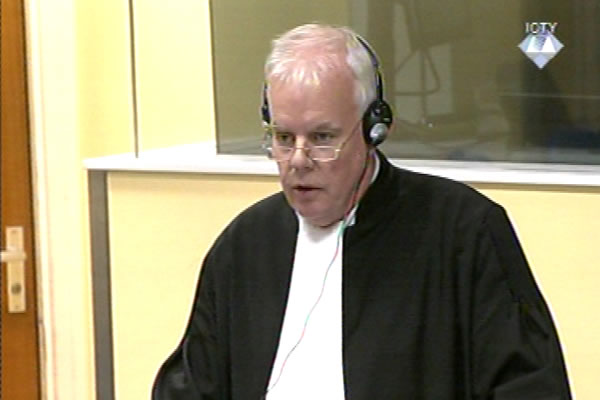Home
PROSECUTION: MLADIC HAD FULL CONTROL OF VRS 'AT HIS FINGERTIPS'
According to the prosecution, the evidence called in its case unequivocally shows that Ratko Mladic was responsible for each crime committed by the forces under his command. As the prosecutor said, Mladic had full control of the VRS 'at his fingertips'
 Dermot Groome, prosecutor at the Ratko Mladic trial
Dermot Groome, prosecutor at the Ratko Mladic trial According to the prosecution, the Trial Chamber should deny Ratko Mladic’s demand to be acquitted at the half-time of the trial. The testimony of more than 360 witnesses and about 5,200 exhibits presented during the prosecution case prove unequivocally all the crimes alleged in the indictment. The witnesses and the evidence clearly show Mladic’s role in the crimes and his criminal responsibility, the prosecutor noted.
Prosecutor Dermot Groome mentioned the entry from Mladic’s war diary for 7 May 1992, a reference to a meeting of the top leadership held behind closed doors. The participants discussed the strategic goals that would be proposed to the Assembly at its session on 12 May 1992. As Mladic wrote down, the first and the most important of the six strategic goals was to ‘separate from the Croats and Muslims forever’. According to the prosecutor, the goals represented the general guidelines for the Republika Srpska Army. Mladic’s entries written at that time ‘placed the campaign of persecution at the heart of the VRS goals’.
According to prosecutor Arthur Traldi, General Mladic, the VRS and the Serb forces controlled by other participants in the joint criminal enterprise carried out the criminal campaign of persecution in a ‘brutally efficient, genocidal way’ in the municipalities from Prijedor in the west to Vlasenica in the east and Foca in the south. The campaign involved the expulsions and mass murders that culminated with the execution of thousands of people from Srebrenica in the summer of 1995.
The destruction of religious and cultural buildings was also part of the pattern of the operation ofthe Bosnian Serb troops. Prosecutor Traldi reminded the judges of the testimony of expert witness Andras Riedlmayer who said that not a single mosque in the municipalities listed in the indictment survived the war. In that way the very ‘essence’ of the non-Serb communities was erased, as was the most visible evidence of their existence.
As prosecutor Camille Bibles said, Mladic played the key role in the artillery and sniper terror campaign in Sarajevo. At the same time, in the municipalities of Kljuc, Sanski Most, Prijedor, Kotor Varos, Vlasenica and Foca thousands of people were killed, suffered serious physical and mental harm and held in conditions designed to destroy them while the survivors were forcibly evacuated. All those acts were substantive elements of the crime of genocide.
At the end of the presentation, prosecutor Groome recalled the conclusion reached by Sir Richard Dannat, British military expert, who said that Mladic had the control of the Bosnian Serb forces 'at his fingertips'. Mladic exercised command and control in the VRS as if it were a complicated piece of machinery, by pressing keys with his fingers.
According to prosecutor Groome, Mladic himself produced some of the most damning evidence called by the prosecution during its case, including the war diaries seized in Mladic’s house in Belgrade in 2008 and 2010, and audio and video recordings of Mladic’s conversations. ‘May they both disappear, God willing’, Mladic told a man by the name of Marinko in 1993: he meant both Muslims and Croats.
Prosecutor Groome also quoted from two documents found in Mladic’s house. The documents were written just after the Dayton agreement was signed. In the first document, dated 14 January 1996, Mladic says that the most important decisions were made by a small group of people in the Main Staff. The most important decisions, ‘on matters that involved risk to life, I often made on my own’, Mladic said.
In the last document Mladic signed as the commander of the VRS Main Staff, transferring his authority to Manojlo Milovanovic, he askedBiljana Plavsic, RS president, to guarantee that none of his soldiers would be criminally prosecuted for any acts they committed on his orders. Mladic asked for that because he knew that many crimes had indeed been committed on his orders, the prosecutor concluded.
The Rule 98 bis hearing continues and is expected to end tomorrow.
Linked Reports
- Case : Mladic
- 2014-03-17 MLADIC 'LOOKS FORWARD' TO HIS DEFENSE CASE TO START
- 2014-02-26 PROSECUTION RESTS ITS CASE, MLADIC’S DEFENSE CASE TO BEGIN ON 13 MAY 2014
- 2013-12-17 MLADIC SEEKS DISQUALIFICATION OF TWO JUDGES
- 2014-03-19 DEFENSE: ‘IRRECONCILABLE DIFFERENCES’ BETWEEN MLADIC AND KARADZIC
- 2014-03-31 MLADIC BACK TO FIVE-DAY WORKING WEEK REGIME
- 2014-04-08 JUDGMENT TO MLADIC AT ‘HALF-TIME’ OF TRIAL ON 15 APRIL 2014
